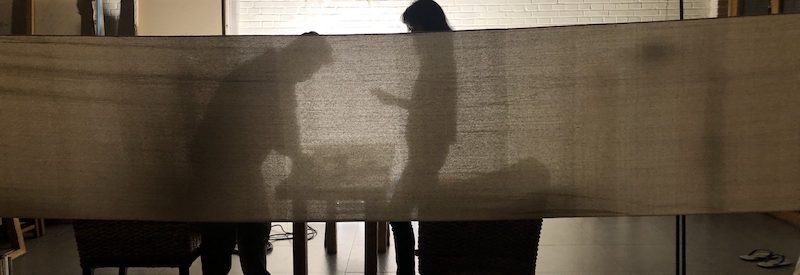Person 一个人
-
Réalisé par Wang ChuYu • Écrit par Wang ChuYu
-
Chine • 2021 • 90 minutes • Couleur et Noir & Blanc
- Réalisation :
Wang ChuYu - Écriture :
Wang ChuYu - Image :
Chen Bo - Son :
Wang ChuYu - Montage :
Wang ChuYu
- Production (personne) :
Shi Lei - Production (structure) :
Beijing Dengxin Culture Media Co LTD
- N° ISAN :
non renseigné
Résumé
"Témoigner, raconter, revenir à nouveau frais sur l'Histoire, les oublis et les non-dits. La tâche à quoi s’attelle Wang ChuYu avec Person, son premier film, est ambitieuse. L'Histoire est celle de Taïwan revisitée à travers un homme, Mo-lin Wang, fondateur du Taiwan Artist Theater. Le film est fait de l'alternance entre deux tableaux composés selon deux régimes visuels et narratifs. On entend d’abord, off, le récit de Wang, où il revient sur son parcours politique et ses méandres, de Taïwan à la Chine dite continentale en passant par le Japon. C’est le parcours d’un homme de gauche, utopiste, pour un temps communiste. Alors que se déplie son récit, à l'image un groupe d’ouvriers s'affaire à monter une structure en bois. C'est ensuite un texte de ce même Mo-lin Wang, The Waste Land – titre emprunté au fameux poème épique de T.S. Eliot – que deux silhouettes vues derrière une toile lisent et commentent. L'écran se fait à la fois voile et page, surface d'inscription. Ce parti pris de mise en scène joue des contradictions d’un texte où l'auteur revient principalement sur les années. Filtre ? Décor ? Échafaudage ? Métaphores, on s’en doute. Les lectures s'emboîtent, les mots se répondent ou arrivent à contretemps dans un fascinant pas de deux. L'Histoire a des mouvements multiples, comme ses modes d'apparition. Les questionnements de l'auteur se frottent d'un tableau à l'autre : histoire politique récente de Taïwan, de la Chine de Mao ou des années 80 et de son capitalisme triomphant, histoire du nationalisme, de la loi martiale, de l'utopie communiste, du socialisme, de la défaite de Tian'anmen. Questionnement sur la place possible, désormais de la notion de personne. Histoire aux échos brûlants, qui "peu à peu à devient cette crotte de chien que tout le monde évite", selon les mots lus par Mo-lin Wang. Wang ChuYu l'esquisse comme un théâtre de spectres parlants et de corps mutiques – ceux des ouvriers en action, contrepoint à la parole émanant d’un corps absent."
(Nicolas Feodoroff - FDIMarseille)
"To bear witness, tell the story, to re-examine history, the things that have been forgotten and those that are left unsaid. The task that Wang ChuYu tackles with Person, his first film, is ambitious. The story is that of Taiwan's history, revisited through a man, Mo-lin Wang, founder of the Taiwan Artist Theatre. The film is made up of two alternating scenes composed of two visual and narrative registers. First, we hear Wang's narrative, in which he recalls his political career and its twists and turns – from Taiwan to mainland China via Japan. It is the journey of a left-wing man, a utopian, who was a Communist for a time. As his story unfolds, on screen a group of workers is busy erecting a wooden structure. The other scene is built on a text by the same Mo-lin Wang, The Waste Land – a title taken from T.S. Eliot's famous epic poem - which two figures glimpsed at behind a canvas are reading and commenting on. The screen becomes both a veil and a page, a surface for inscriptions. This staging bias plays on the contradictions of a text in which the author primarily returns to years past. Filter ? Scenery ? Scaffolding ? Metaphors, one suspects. The readings link together, the words echo each other or go out of sync in a fascinating pas de deux. History has multiple movements, like the ways in which it is presented. The author's questioning jostles from one scene to another : the recent political history of Taiwan, Mao's China and the triumphant capitalism of the 1980s, the history of nationalism, martial law, communist utopia, socialism and the defeat of Tiananmen Square. A reflection on the possible role, from this point on, of the notion of the person. A story with fiery echoes, which "little by little is becoming the dog turd that everyone's avoiding", in the words of Mo-lin Wang. Wang ChuYu sketches it out as a drama of talking ghosts and mute bodies - those of the workers in action, in counterpoint to the speech emanating from an absent body."
(Nicolas Feodoroff - FDIMarseille)
Sélections et distinctions
- 2022 • FIDMarseille - Festival International de Cinéma de Marseille • Marseille (France) • Mentions spéciales - Première Mondiale
Comment avoir accès au film ?
-
Édition DVD
- Il n'existe pas d'édition DVD à notre connaissance
-
Accès VOD
- Il n'existe pas d'accès en VOD à notre connaissance
- Distribution
- Aide sur les moyens d'accéder à un film
